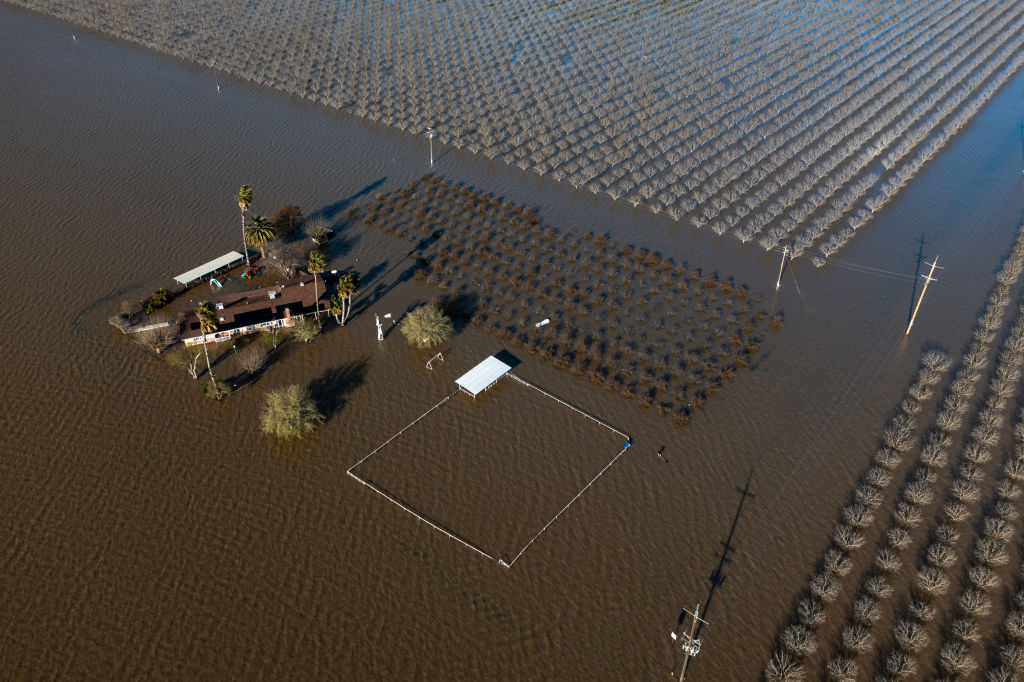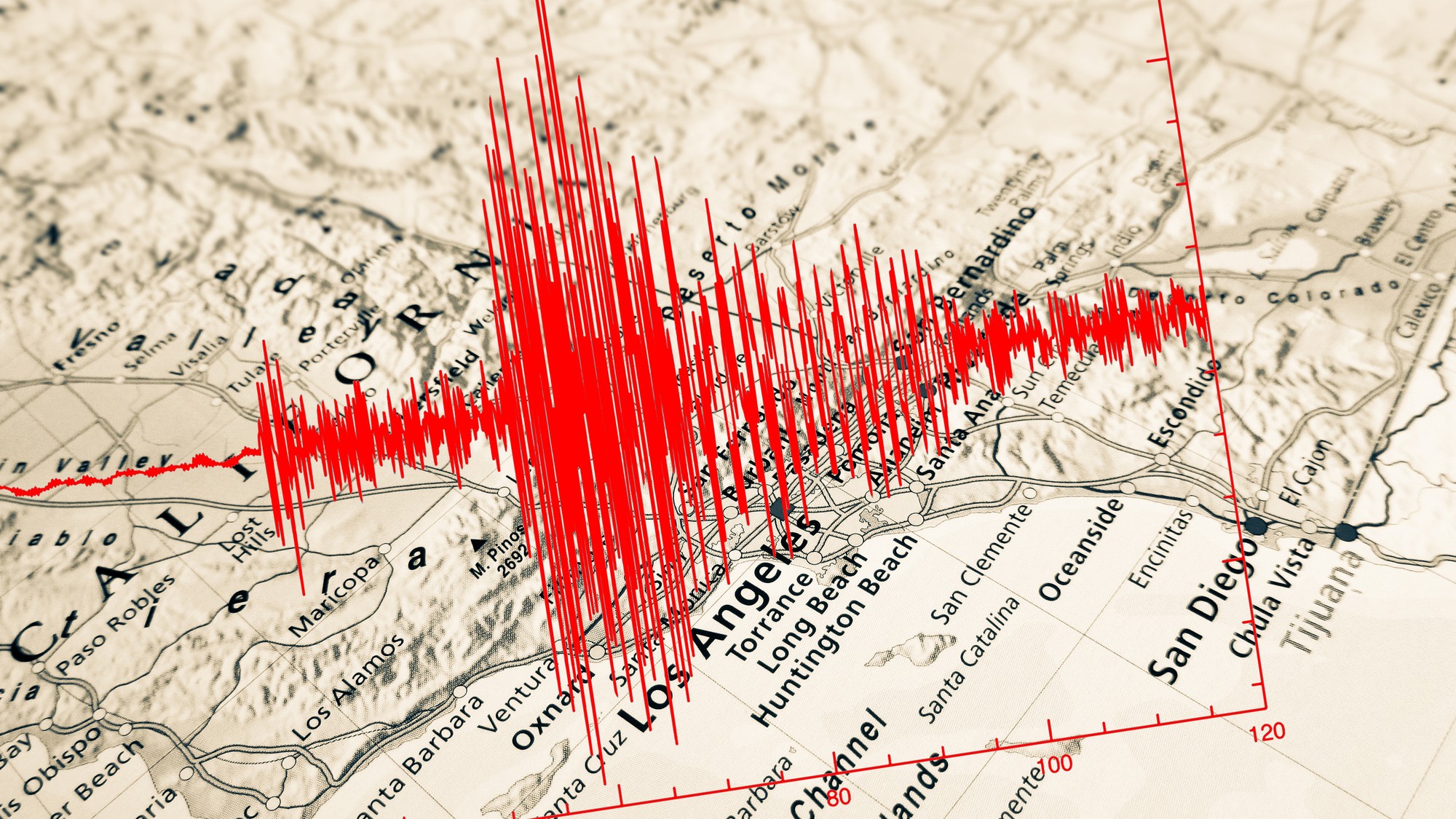The snowmelt in California could cause a long-lost lake to re-emerge


California's extreme rain and snow may cause a once-lost lake to re-emerge, Axios reports. The season's snowmelt could cause the state's Tulare Lake to return after being dried up for approximately 80 years, according to Newsweek.
Indeed, "there is more and more water pouring into the Tulare Lake Basin and that water is not going to be leaving the basin for the foreseeable future," per Daniel Swain, a UCLA climate scientist. Tulare used to be the largest freshwater lake west of the Mississippi River, and last appeared in 1982.
California has set a record high for snowpack, raising flood concerns for ranchers and farmers as the precipitation melts. "Unfortunately, the reality is all of these areas are likely going to flood eventually this spring as the flooding continues to worsen," Swain continued, adding that there are "some very powerful agricultural interests ... engaging in unilateral actions that might actually harm adjacent communities," namely farmers and low-income regions.
Subscribe to The Week
Escape your echo chamber. Get the facts behind the news, plus analysis from multiple perspectives.

Sign up for The Week's Free Newsletters
From our morning news briefing to a weekly Good News Newsletter, get the best of The Week delivered directly to your inbox.
From our morning news briefing to a weekly Good News Newsletter, get the best of The Week delivered directly to your inbox.
And the return of Tulare Lake will spell trouble for the surrounding area, which is likely to become inundated with water, writes the San Francisco Chronicle. "There's a lot of uncertainty with the snowmelt," explains Greg Gatzka, city manager of Corcoran, California, one of the cities near the lake. "If it becomes too much water, it's a whole different situation."
"These are rural communities of color that are home to the people who grow and pick the produce of the Central Valley, and we're bearing the brunt," said Dezaraye Bagalayos, director of program coordination for the Allensworth Progressive Association. Climate change has made the risk of excessive snowpack and melt higher, leaving communities to deal with flood prevention themselves. "This can't continue to happen. It's not acceptable for us to get flooded up."
Sign up for Today's Best Articles in your inbox
A free daily email with the biggest news stories of the day – and the best features from TheWeek.com
Devika Rao has worked as a staff writer at The Week since 2022, covering science, the environment, climate and business. She previously worked as a policy associate for a nonprofit organization advocating for environmental action from a business perspective.
-
 The genetic secrets of South Korea's female free-divers
The genetic secrets of South Korea's female free-diversUnder The Radar Unique physiology of 'real-life mermaid' haenyeo women could help treat chronic diseases
-
 Democrats: How to rebuild a damaged brand
Democrats: How to rebuild a damaged brandFeature Trump's approval rating is sinking, but so is the Democratic brand
-
 Unraveling autism
Unraveling autismFeature RFK Jr. has vowed to find the root cause of the 'autism epidemic' in months. Scientists have doubts.
-
 Sea lion proves animals can keep a beat
Sea lion proves animals can keep a beatspeed read A sea lion named Ronan beat a group of college students in a rhythmic dance-off, says new study
-
 Humans heal much slower than other mammals
Humans heal much slower than other mammalsSpeed Read Slower healing may have been an evolutionary trade-off when we shed fur for sweat glands
-
 Novel 'bone collector' caterpillar wears its prey
Novel 'bone collector' caterpillar wears its preySpeed Read Hawaiian scientists discover a carnivorous caterpillar that decorates its shell with the body parts of dead insects
-
 The lesser-known Elsinore fault is a risk to California
The lesser-known Elsinore fault is a risk to CaliforniaThe Explainer A powerful earthquake could be on the horizon
-
 Scientists find hint of alien life on distant world
Scientists find hint of alien life on distant worldSpeed Read NASA's James Webb Space Telescope has detected a possible signature of life on planet K2-18b
-
 Katy Perry, Gayle King visit space on Bezos rocket
Katy Perry, Gayle King visit space on Bezos rocketSpeed Read Six well-known women went into lower orbit for 11 minutes
-
 Scientists map miles of wiring in mouse brain
Scientists map miles of wiring in mouse brainSpeed Read Researchers have created the 'largest and most detailed wiring diagram of a mammalian brain to date,' said Nature
-
 Scientists genetically revive extinct 'dire wolves'
Scientists genetically revive extinct 'dire wolves'Speed Read A 'de-extinction' company has revived the species made popular by HBO's 'Game of Thrones'